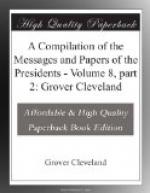There is another ground for the adoption of the veto principle, which had probably more influence in recommending it to the Convention than any other. I refer to the security which it gives to the just and equitable action of the Legislature upon all parts of the Union. It could not but have occurred to the Convention that in a country so extensive, embracing so great a variety of soil and climate, and consequently of products, and which from the same causes must ever exhibit a great difference in the amount of the population of its various sections, calling for a great diversity in the employments of the people, that the legislation of the majority might not always justly regard the rights and interests of the minority, and that acts of this character might be passed under an express grant by the words of the Constitution, and therefore not within the competency of the judiciary to declare void; that however enlightened and patriotic they might suppose from past experience the members of Congress might be, and however largely partaking, in the general, of the liberal feelings of the people, it was impossible to expect that bodies so constituted should not sometimes be controlled by local interests and sectional feelings. It was proper, therefore, to provide some umpire from whose situation and mode of appointment more independence and freedom from such influences might be expected. Such a one was afforded by the executive department constituted by the Constitution. A person elected to that high office, having his constituents in every section, State, and subdivision of the Union, must consider himself bound by the most solemn sanctions to guard, protect, and defend the rights of all and of every portion, great or small, from the injustice and oppression of the rest. I consider the veto power, therefore, given by the Constitution to the Executive of the United States solely as a conservative power, to be used only, first, to protect the Constitution from violation; Secondly, the people from the effects of hasty legislation where their will has been probably disregarded or not well understood, and, thirdly, to prevent the effects of combinations violative of the rights of minorities. In reference to the second of these objects I may observe that I consider it the right and privilege of the people to decide disputed points of the Constitution arising from the general grant of power to Congress to carry into effect the powers expressly given; and I believe with Mr. Madison that “repeated recognitions under varied circumstances in acts of the legislative, executive, and judicial branches of the Government, accompanied by indications in different modes of the concurrence of the general will of the nation,” as affording to the President sufficient authority for his considering such disputed points as settled.




